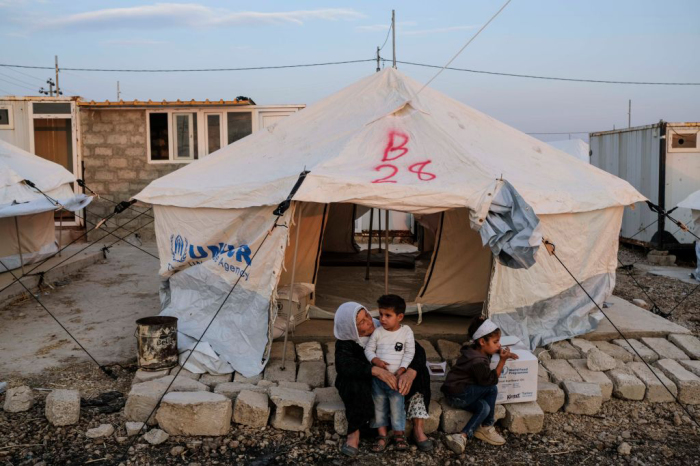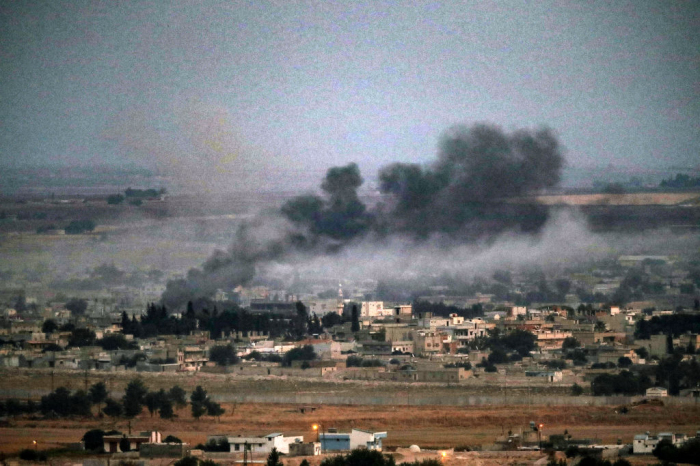Turkish-backed militants persecuting Christians, Yazidis after US troop pullback: USCIRF

A religious freedom scholar told the United States' top religious freedom panel that the U.S. troop pullback in northeastern Syria has created a “vacuum” that has allowed Turkish forces and affiliated opposition groups to carry out war crimes against Christians and other religious minorities.
The U.S. Commission on International Religious Freedom held a hearing last week focusing on the opportunities and challenges related to religious freedom in northeast Syria amid the Turkish occupation and President Donald Trump’s decision to pull back U.S. troops in the region.
It is the same region where the Islamic State of Iraq and Syria held territory and severely persecuted religious minorities until the jihadis were pushed out by Kurdish-led and U.S.-backed Syrian Democratic Forces and coalition partners in 2017.
But since early 2018, operations by the Turkish military and Turkish-backed Islamic militant groups have taken over areas that were once under the control of the Autonomous Administration of North and East Syria and have reportedly killed, abducted and persecuted civilians. The offensive has led to the displacement of tens of thousands, if not hundreds of thousands.
“It was in the northeastern pocket of Kobane that Syrian Democratic Forces staged what began as a last stand but with the support of U.S. military and a committed multinational force became a four-year effort to turn back and eventually defeat ISIS,” USCIRF Chairman Tony Perkins said at the beginning of the hearing.
“It was also in this part of Syria that those same democratic forces and their supporters forged a unique initiative to introduce local governance autonomous from the Assad regime based on principles of inclusion, diverse representation and personal freedoms, including religious freedom, that aligns more closely with the 1948 Universal Declaration of Human Rights than anything else in that region.”
But in October 2019 after a phone conversation with Turkey President Recep Tayyip Erdoğan, President Donald Trump announced that the U.S. military would pull back its troops in advance of a Turkish offensive against SDF-controlled areas. Critics feared the move was an abandonment of allies in the fight to defeat the Islamic State.
The Turkish offensive caused thousands to flee from their homes. Because it is led by Kurdish fighters, Turkey has considered the U.S.-backed SDF to be a terrorist group and accuses it of being aligned with the Kurdistan Workers' Party.
“I visited northeast Syria in late 2019 where I was able to see for myself the devastation brought upon the Christian villages near the area Turkey had invaded,” USCIRF Vice-Chair Nadine Maenza said. “I met with religious and community leaders and heard about the remarkable religious freedom conditions under the autonomous administration and how that is now nonexistent in the area Turkey occupies.”
“Turkey is now threatening the crucial population centers of Kobane and Qamishli even as it has used the world’s complete inattention to forcefully repopulate abandoned towns with refugees from other parts of Syria, just as it had done in Afrin [in February 2018],” she added. “[These] are actions that Genocide Watch has just indicated are war crimes fitting the legal definition of crimes against humanity.”
Amy Austin Holmes, a senior fellow at the Woodrow Wilson Center and a professor at the American University in Cairo, told the panel that Christians, Yazidis and other religious minorities that have existed in the region for centuries are again facing existential threats.
Holmes noted that some of the fighters in the Turkish-backed militias are former members of the Islamic State.
“They have been killed, disappeared, kidnapped, raped, detained, subjected to forced religious conversions and held for ransom until their families pay exorbitant sums of money to secure their release,” Holmes explained. “They have been forcibly displaced and driven from their homes. Their places of worship have been defaced, destroyed and looted. Even their cemeteries have been demolished and vandalized. The international community has failed to take action.”

Holmes, who is also a visiting scholar at the Middle East Initiative of Harvard University, explained that “the partial withdrawal of U.S. forces in October 2019 created a vacuum allowing these crimes to take place.”
“Christian and Yazidi organizations warned that this would happen before the Turkish intervention,” she said.
Holmes said that since the Turkish occupation of Afrin in early 2018, all 23 Yazidi villages and all 19 Yazidi shrines have come under Turkish control, many of which have been defaced or looted. Yazidis are a religious minority community, thousands of who faced some of the most atrocious killings and enslavements under the Islamic State.
She said that an estimated 90% of the Yazidi population has fled from Afrin, saying that some estimates suggest that what was once a population of 20,000 to 30,000 Yazidis in Afrin is now down to 2,000-3,000.
Kurds and Yazidis have been kidnapped by Turkish-back militias who charge large ransoms from their families for release, she noted.
“This is a way to engage in ethnic cleansing and demographic change without actually killing people because they cannot afford to pay this ransom,” Holmes said.
As a result of the Turkish intervention last October as part of its “Operation Peace Spring,” Holmes said that at least 137 Christian families were displaced.
“I also provided a list in my written testimony of those Christians who been displaced and the villages from which they have been forcibly displaced,” she said. “The second deadliest site of the Armenian genocide … is under the control of Turkey and Islamist militias.”
Holmes explained that the Turkish-backed Syrian National Army, in areas it controls, is attempting to “dismantle the laws that guarantee religious equality, religious freedom and gender equality that were created by the autonomous administration.”
“This includes attempts to force Yazidis, in particular, to renounce their religion and convert to Islam. This includes signs that have been placed in Afrin … that demand that women wear a veil. Women have been arrested by Turkish-backed militias in Afrin and elsewhere who travel without a male relative. This is the same policy that ISIS enforced on women in areas that ISIS used to control. They required that Muslim women if they wanted to leave their homes, had to travel with a male guardian.”
Holmes further warned that there are 35 Assyrian Christian villages within less than six miles of the front lines of the Turkish intervention.
“The Syrian Democratic Forces are the only armed group in Syria that has a policy of not discriminating on the basis of religion, ethnicity or gender,” Holmes argued. “My survey data shows that the SDF has incorporated members of all religious groups, of all ethnic groups. Arabs from every major and minor tribe in Syria have members how joined the SDF.”
In her remarks, Maenza, a longtime speaker, writer and advocate, warned that the U.S. troop drawback in northeast Syria “signaled tacit approval for Turkey to cross the border.”
“In December, former deputy assistant secretary for Department of Defense policy in the Middle East told Foreign Policy magazine, ‘Looking back at it, one could say we helped facilitate the military incursion because essentially, we helped the Turks do reconnaissance. And since the SDF were with us, they believed they weren’t going to be attacked and disabled several of their defensive positions.’”
USCIRF, an independent council that advises the federal government and Congress on issues of religious freedom, recommends that the U.S. government “exert significant pressure on Turkey to provide a timeline for its withdrawal from Syria.”
USCIRF also recommends that the U.S. increase its engagement with and assistance to the autonomous administration in northeast Syria and called on the U.S. government to exempt the autonomous region from sanctions as well as work with nongovernmental organization and international partners to fund and develop local programs that promote religious tolerance, human rights and alleviate sectarian tensions.
On Friday, USCIRF condemned Turkey’s latest round of airstrikes and ground operations near civilian areas in northern Iraq and called for an “immediate end to these actions.”
“Turkey’s operations in Iraq and northeastern Syria make it clear that regional ambitions — not domestic security — are driving its actions today, and it cannot be allowed to do so with impunity,” Perkins said in a statement. “We call upon the administration to utilize all diplomatic and economic leverage to protect vulnerable religious minorities in northern Iraq — as well as neighboring northeastern Syria — from Turkey’s indiscriminate military operations.”
Follow Samuel Smith on Twitter: @IamSamSmith
or Facebook: SamuelSmithCP





























